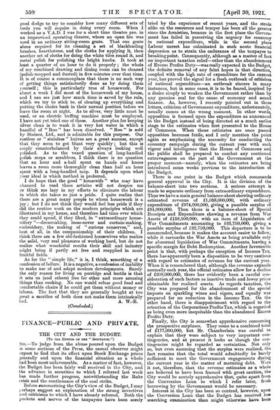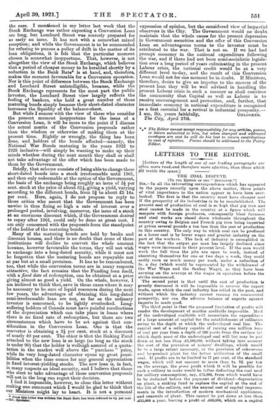FINANCE-PUBLIC AND PRIVATE,
THE CITY AND THE BUDGET.
Cro THE Elinvoa or 7E2 "SPECHLTOR."i 3IE,—To judge from the abuse poured upon the Budget in some sections of the Press, the casual observer might expect to find that its effect upon Stock Exchange prices generally and upon the financial situation as a whole had. been most unfavourable. As a matter of fact, however, the Budget has been fairly well received in the City, and the advance in securities to which I referred last week has made further progress, notwithstanding the Ruhr crisis and the continuance of the coal strike.
Before summarizing the City's view of the Budget, I may perhaps suggest an explanation of the strong invectives and criticisms to which I have already referred. Both the pockets and nerves of the taxpayers have been sorely tried by the experience of recent years, and the strain alike on the resources and temper has been all the greater since the Armistice, because in the first place the Govern- ment has failed in perceiving the urgency for economy in national expenditure, while in the second place Labour unrest has culminated in such acute financial depression as to strain the endurance of the taxpayer to breaking point. Consequently, although as a matter of fact no important taxation relief—other than the abandonment of Excess Profits Duty—was really expected in the Budget, the definite removal of any faint hopes in that direction, coupled. with the high rate of expenditure for the current year, has proved the signal for a fresh outbreak of criticism of national expenditure—an outbreak sincere in many instances, but in some cases, it is to be feared, inspired by a desire simply to weaken the Government rather than by any genuine zeal for the cause of economy and sound finance. As, however, I recently pointed out in these letters, criticism of Government expenditure, unfortunately, usually comes at the wrong moment. In other words, opposition is focused upon the expenditure as announced in the Budget instead of being directed at a much earlier stage to the estimates when first presented to the House of Commons. When those estimates are once passed opposition becomes futile and I only mention the point again as emphasizing the necessity for conducting the economy campaign during the current year with such vigour and intelligence that the House of Commons and the public shall be prepared to combat any continued extravagances on the part of the Government at the proper moment—namely, when the estimates are being introduced some weeks previous to the introduction of the Budget.
There is one point in the Budget which commands general approval in the City. It is the division of the balance-sheet into two sections. A serious attempt is made to separate ordinary from extraordinary expenditure. Thus we have a main general balance-sheet showing ordinary estimated revenue of £1,058,000,000, with ordinary expenditure of £974,000,000, giving a possible surplus of f84,000,000. Then there is a balance-sheet of Special Receipts and Expenditure showing a revenue from War Assets of £158,500,000, with an item of Liquidation of War Commitments amounting to £65,750,000, giving a possible surplus of £92,750,000. This departure is to be commended, because it makes the account easier to follow, while it earmarks the War Assets as being available only for abnormal liquidation of War Commitments, leaving a specific margin for Debt Redemption. Another favourable point is that, with perhaps the exception of Income Tax, there has apparently been a disposition to be very cautious with regard to estimates of revenue for the current year. When it is remembered that, although the revenue expands normally each year, the official estimates allow for a decline of £209,000,000, there has evidently been a careful con- sideration of such factors as inactive trade and lower prices obtainable for realized assets. As regards taxation, the City was prepared for the abandonment of the special imposts on sparkling wines and cigars; and equally was prepared for no reduction in the Income Tax. On the other hand, there is disappointment with regard. to the retention of the Corporations Profits Tax, which is regarded as being even more inequitable than the abandoned Excess Profits Duty. Finally, the City is somewhat apprehensive concerning the prospective surpluses. They come to a combined total of £177,000,000, but Mr. Chamberlain was careful to explain that they were subject to very important con- tingencies, and at present it looks as though the con- tingencies might be regarded as certainties. Not only so, but even assuming that the surplus were realized, the fact remains that the total would admittedly be barely sufficient to meet the Government engagements during the current year in the matter of maturing debt. Were it not, therefore, that the revenue estimates as- a whole are believed to have been framed with great caution, the City would be acutely apprehensive that, quite apart from the Conversion Loan to which I refer later, fresh borrowing by the Government would be necessary. Interest in the City has been so centred, however, upon the Conversion Loan that the Budget has received less searching examination than might otherwise have been the case. I mentioned in my letter last week that the Stock Exchange was rather expecting a Conversion Loan ere long, but Lombard Street was scarcely prepared for so early an issue. It has met with a somewhat mixed reception; and while the Government is to be commended for refusing to pursue a policy of drift in the matter of its loan obligations, it is felt that the particular moment ohosen is somewhat inopportune. That, however, is not altogether the view of the Stock Exchange, which believes that a period of cheaper money to be heralded shortly by a reduction in the Bank Rate* is at hand, and, therefore, makes the moment favourable for a Conversion operation. Nor is this point of difference between the Stock Exchange and Lombard Street unintelligible, because, while the Stock Exchange represents for the most part the public investor, the Lombard Street view largely reflects the feelin of bankers, who hold a great number of these ma bonds simply because their short-dated character increases the liquidity of the balance-sheet. But while I concur with the view of those who consider the present moment inopportune for the issue of a Conversion Loan, it will be more to the point if I discuss the actual merits of the Conversion proposals rather than the wisdom or otherwise of making them at the present time. Rightly or wrongly, the thing has been done, and holders of the bonds affected—namely, the National War Bonds maturing in the years 1922 to 1925 inclusive—will simply be wanting to make up their minds whether during the next month they shall or shall not take advantage of the offer which has been made to them by the Government. Briefly, that scheme consists of being able to change these short-dated bonds into a stock irredeemable until 1961, and then only redeemable at the option of the Government, the basis of the exchange being roughly an issue of sit per cent. stock at the price of about 61k, giving a yield, varying according to the different bonds, from 51 to about £5 14s. per cent. Here, again, I do not propose to reply to those critics who assert, that the Government has been unwise in thus fixing so high a rate of interest over a prolonged period, involving, moreover, the issue of a stock at an enormous discount which, if the Gcriernment desired to repay after 1961, could only be done at great cost. I am only concerned with the proposals from the standpoint of the holder of the maturing bonds.
Many of the maturing bonds are held by banks and discount houses, and there is no doubt that some of these institutions will decline to convert the whole amount because, however favourable the terms, they will not wish to exchange into a long-dated security, while it must not be forgotten that the maturing bonds are repayable not at par but at a small premium. It has to be remembered, too, that while the conversion terms are in many respects attractive, the fact remains that the Funding loan itself, with a fixed date of redemption, can be obtained at a price giving almost as good a yield. On the whole, however, I am inclined to think that, save in those cases where it may be necessary to be sure of liquid resources during the next few years, the advantages of obtaining this long-dated semi-irredeemable loan are not, so far as the ordinary investor is concerned, to be lightly overlooked. Long- suffering holders of Consols must have painful recollections of the depreciation which can take place in loans where there is no fixed rate of redemption, but there are two circumstances which have to be set against that con- sideration in the Conversion Loan. One is that the converter is obtaining a 3i per cent. stock at a discount of nearly 40 per cent. The other is that the Sinking Fund attached to the new loan is so large (so long as the stock Is under 90) that the holder is -wellnigh assured of a quota- tation in the market well above the " purchase " price, while its very long-dated character opens up great possi- bilities when the time comes for any general appreciation in fixed interest-yielding stocks. The new loan is, in fact, in many respects an ideal security, and I believe that those who elect to take advantage of these conversion proposals will not in the long run regret their decision. I find it impossible, however, to close this letter without in urakillisters one comment which I would be glad to think that o might lay to heart. It is not a personal :Mace fhb letter war written the Bank Rate has been reduced to 61 per cent. BPadater. expression of opinion, but the considered view of impartial observers in the City. The Government would no doubt maintain that the whole cause for the present depression in Government securities and the offer of this Conversion Loan on advantageous terms to the investor must be attributed to the war. That is not so. If we had had prompt economy in the national expenditure following the war, and if there had not been semi-socialistic legisla- tion over a long period of years culminating in the present Labour crisis, the national credit would be at a very different level to-day, and the result of this Conversion Loan would not for one moment be in doubt. If Ministers, therefore, desire to give an impetus to the success of the present loan they will be well advised in handling the present Labour crisis in such a manner as shall convince the community that Capital as well as Labour is to receive encouragement and protection, and, further, that immediate economy in national expenditure is recognized as a first essential for a revival in industrial prosperity.—



































 Previous page
Previous page